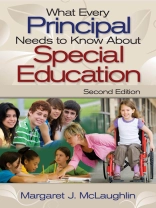‘Contains critical information that administrators need as they navigate special education policies and procedures. Administrators will discover a practical process for not only improving the quality of special education services, but also for transforming the teaching/learning cycle for all students.’
—Kim Benton, Executive Director of Federal Programs and Special Populations
Meridian Public Schools, MS
Lead effective special education programs that promote student achievement!
The No Child Left Behind Act and other recent federal mandates have established a new level of accountability for special education programs. Updated to reflect these changes, this practical guide assists principals in developing special education programs that address current standards and students′ diverse needs.
The second edition of Mc Laughlin′s bestseller provides a straightforward overview of special education for principals and other administrators. This resource offers insights on how to lead programs for students with special needs and covers basic legal and procedural information. Written by a well-known and respected scholar in special education, this guide includes new information that enables principals to:
- Fulfill requirements of NCLB and the 2004 reauthorization of IDEA, including standards-based individualized education programs
- Ensure that special education students can appropriately access the general curriculum
- Understand standardized testing options and accommodations to comply with federal law
- Support accurate identification and eligibility decisions, including Response to Intervention procedures
- Promote positive behavior and encourage family involvement
Help your students with disabilities reach their full potential through high-quality special education programs and services.
विषयसूची
Preface to the Second Edition
Acknowledgments
About the Author
Introduction: What Every Principal Needs to Know About Special Education
Five Things Every Principal Needs to Know About Special Education
Section I. Creating Quality Special Education: Understanding the Basics of Special Education
What Is an Appropriate Education?
The IEP
The Least Restrictive Environment
Who Is Eligible for Special Education?
Procedural Safeguards – “The Law in Special Education”
Other Important Laws Affecting Students With Disabilities
Legal Issues and Assessing Students With Disabilities
Other Federal Disability Laws
Understanding the Differences Among Federal, State, and Local Special Education Requirements
Section II. Creating Quality Special Education: The Foundations
A New Model of Special Education
Access to the General Education Curriculum
Understanding Accommodations
Developing Standards-Based IEPs
Promoting Positive Behavior or How to Avoid the Discipline Problem
Positive Behavioral Interventions and Supports
Building Strong Parent and Family Connections
Section III. Creating Quality Special Education: The Context
Adopt Evidence-Based Practices
What Are Evidenced-Based Practices?
The Importance of Using Published Research
Quality of Evidence
Data-Based Decision Making
Creating Shared Responsibility for Students With Disabilities
Collaboration Between General and Special Educators
Section IV. Summary
Glossary
References
Index
लेखक के बारे में
Margaret Mc Laughlin has been involved in special education all of her professional career, beginning as a teacher of students with serious emotional and behavior disorders. Currently she is the associate director of the Institute for the Study of Exceptional Children, a research institute within the College of Education at the University of Maryland. She directs several national projects investigating educational reform and students with disabilities, including the national Educational Policy Reform Research Institute (EPRRI), a consortium involving the University Maryland; The National Center on Educational Outcomes (NCEO); and the Urban Special Education Collaborative. She also directs a national research project investigating special education in charter schools and leads a policy leadership doctoral and postdoctoral program in conducting large-scale research in special education. Mc Laughlin has worked in Bosnia, Nicaragua, and Guatemala in developing programs for students with developmental disabilities. She has consulted with numerous state departments of education and local education agencies on issues related to students with disabilities and the impact of standards-driven reform policies. Mc Laughlin co-chaired the National Academy of Sciences Committee on Goals 2000 and Students with Disabilities, which resulted in the report Educating One and All. She was a member of the NAS committee on the disproportionate representation of minority students in special education.Mc Laughlin teaches graduate courses in disability policy and has written extensively in the area of school reform and students with disabilities. She earned her Ph D at the University of Virginia and has held positions at the U.S. Office of Education and the University of Washington.











